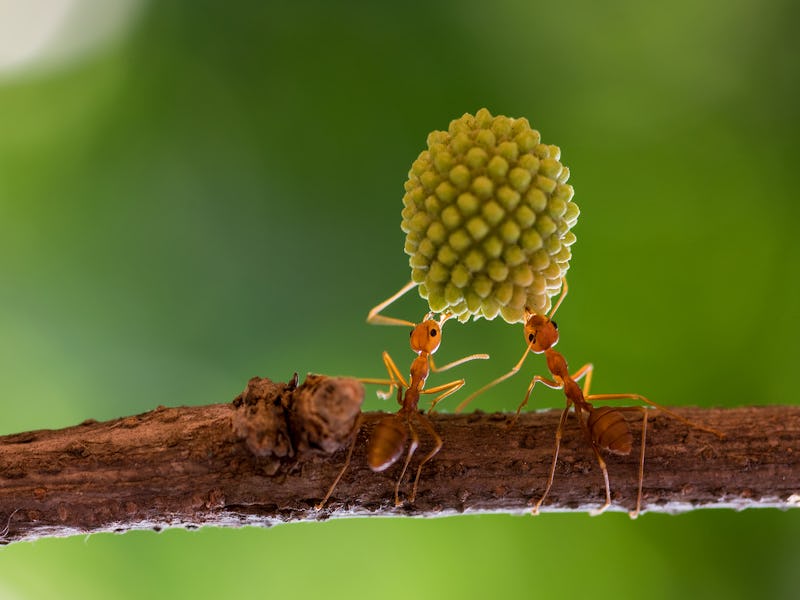One surprising insect could help solve farming’s pest problem
These tiny critters can serve as "biological pest control," new research suggests.

For most humans, ants are a nuisance. But while you may fret about them munching on your meal, according to a new study, ants actually might help to protect our food from other insect pests.
In a new study, researchers found that ants may be a sustainable pest control method. The research was published Wednesday in the journal Proceedings of the Royal Society B.
“Our study encourages farmers to use more sustainable practices such as biological control provided by ants and practices of shaded crops as a way to naturally promote ants in crop systems,” Diego Anjos, lead author of the study and post-doctoral researcher at the Federal University of Uberlândia, tells Inverse.
What they found — Researchers analyzed more than 50 studies from around the world, honing in on papers that investigated the effects of ants on crop yield, plant damage, and the abundance of insect pests. The studies focused on a variety of crops ranging from coffee to citrus.
The results: These tiny ants can pack a big punch.
“Our new study found that ants decrease the abundance of some groups of pests, decrease plant damage, and increase crop yield,” Anjos says.
The humble ant is a more sustainable — and lower-cost — form of pest control than traditional pesticides
Ants most effectively reduced the number of pests that don’t produce honeydew — a sticky sap that some insects release when they eat plants. These insects tend to spend more time in the soil, exposing them to ants, who gobble them up as a protein-rich snack.
On the other hand, ants weren’t so great for insects that do produce honeydew — like aphids — and the presence of ants actually increased the aphids’ numbers. Ants have a mutually-beneficial relationship with these honeydew-producing insects and consume the honeydew they secrete. In exchange, the ants provide transport and protection for the aphids. Similarly, the ants also decreased the abundance pests’ natural enemies — like parasitic wasps — which help curb the pest population.
While the ants had some negative effects, researchers say those impacts were largely outweighed by the positive benefits for crop yield and pest reduction.
Ants reduced the presence of non-honeydew pests by a walloping 104 percent in crops that grow in the shade. The insects were most effective at controlling pests in crop fields with greater plant diversity as opposed to monocultures — agricultural operations that plant a large quantity of a single species. The critters also reduced damage to crops regardless of the kind of pest feasting on the plant. Fruit flies, for example, avoid laying eggs in plants scented with ant pheromones.
“Overall, the mere presence of ants, regardless of their body size, provided pivotal services for crops,” the researchers conclude.
Why it matters — As it turns out, those pesky ants can actually match or even exceed the effectiveness of chemical pesticides.
Biological pest control is a method that advocates for using enemies of pests — like ants but also spiders, birds, fungi, and viruses — to naturally control these insects, rather than using artificial pesticides. They found that ants continued to increase crop yield over time, thereby avoiding the issue where insects develop resistance to chemical pesticides in the long run.
“Biological pest control is usually better for the environment, as pesticides can contaminate soil and water with chemical residues,” Anjos says.
The researchers call for farmers to plant a greater number of shaded plants to “naturally promote” ants in crop systems. In short: The practices that enable greater biodiversity and sustainability in agriculture will also naturally attract ants, which Anjos calls a “low-cost solution” to the massive pest problem. According to a 2021 study by the UN’s Food and Agriculture Organization, agricultural pests cost the global economy roughly $70 billion.
“I believe that the new generation of farmers is open and willing to use more environmentally friendly practices,” Anjos says.
What’s next — There are some limitations to the study since the paper mostly concerns ants as a whole and doesn’t focus on specific species that may yield the greatest benefit to agriculture.
Anjo says future studies should consider factors that “can affect the role of ants on pest control in a changing world” like climate change and the status of ants as invasive species.
With these steps, we might one day see a world where nature’s humblest servants — not chemical pesticides — keep our food healthy and pest-free.